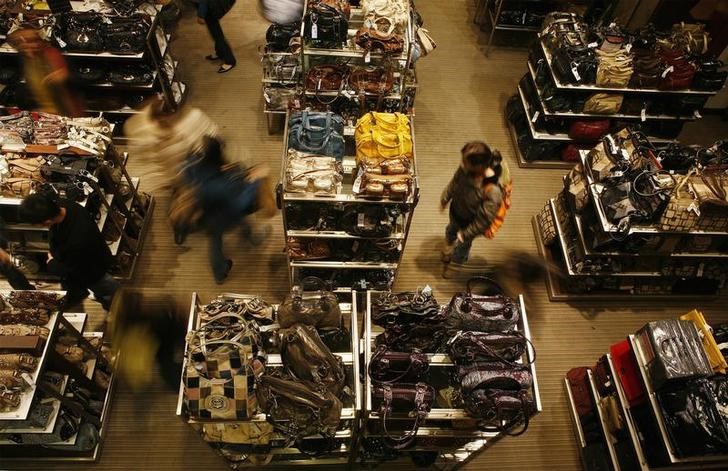By Lucia Mutikani
WASHINGTON (Reuters) - U.S. retail sales rose more than expected in October as households bought motor vehicles and a range of other goods, pointing to sustained economic strength that could allow the Federal Reserve to raise interest rates next month.
The Commerce Department said on Tuesday retail sales increased 0.8 percent last month, also boosted by demand for building materials, likely as households cleaned up and made repairs in the wake of Hurricane Matthew.
"This is just the kind of data the Fed doves need to see to convince them to hike rates in December. The economy is doing pretty well, this data is bullish for the economic outlook in the months ahead," said Chris Rupkey, chief economist at MUFG Union Bank in New York.
Adding to the report's strong tone, September retail sales were revised up to show a 1.0 percent increase instead of the previously reported 0.6 percent rise. The combined September and October sales gain was the largest two-month rise since early 2014. Sales were up 4.3 percent from a year ago.
Excluding automobiles, gasoline, building materials and food services, retail sales jumped 0.8 percent last month after an upwardly revised 0.3 percent gain in September.
These so-called core retail sales, which correspond most closely with the consumer spending component of gross domestic product, were previously reported to have risen 0.1 percent in September.
Economists had forecast overall retail sales increasing 0.6 percent and core sales advancing 0.3 percent last month.
The strong sales report is a good omen heading into the holiday shopping season. Last week, Macy's and Kohl's Corp expressed optimism about the holiday shopping season, despite reporting a decline in sales in the third quarter.
U.S. stocks were trading mostly higher, while the dollar was little changed against a basket of currencies. U.S. Treasuries rose after declining for five straight trading sessions.
SUSTAINED STRENGTH
September's upward revision to core retail sales suggests that the economy's 2.9 percent annualized growth rate in the third quarter could be raised when the government publishes its second GDP estimate later this month.
Coming on the heels of data this month showing a rapidly tightening labor market and signs of a turnaround in the manufacturing sector, the upbeat retail sales report implied a pickup in economic activity early in the fourth quarter.
The Atlanta Fed lifted its fourth-quarter GDP growth estimate by two-tenths of a percentage point to a 3.3 percent rate after Tuesday's data.
The report also reinforced views that the Fed will raise interest rates at its Dec. 13-14 policy meeting.
Rate hike prospects have also been boosted by a rally in U.S. stocks in the wake of the last week's election of Republican candidate Donald Trump as the next president, despite a lot of hand-wringing over his proposed policies.
The Fed this month left interest rates unchanged but said its monetary policy-setting committee "judges that the case for an increase in the federal funds rate has continued to strengthen." The U.S. central bank raised its benchmark overnight interest rate last December and has held it steady since, largely because of concerns over low inflation.
But inflation is creeping higher. A separate report on Tuesday from the Labor Department showed import prices increased 0.5 percent in October after gaining 0.2 percent in September. In the 12 months through October, import prices fell 0.2 percent, the smallest decrease since July 2014, after declining 1.0 percent in September.
Retail sales last month were driven by a 1.1 percent increase in auto sales and a 1.5 percent surge in receipts at online retailers. Online retailers like Amazon (NASDAQ:AMZN) have been grabbing market share from traditional department chains like Macy's and Kohl's.
Sales at building material stores increased 1.1 percent following a 1.8 percent rise in September. The strength in this category was reflected in Home Depot's robust third-quarter profit and sales reported on Tuesday.
Receipts at sporting goods and hobby stores rose 1.3 percent. Sales at restaurants and bars, however, fell 0.7 percent, likely as the stormy weather kept people at home.
Households also spent more on clothing, groceries and grooming last month, but cut back on furniture. Receipts at service stations advanced 2.2 percent on rising gasoline prices.

"As uncertainty over the election outcome remains elevated, October's retail sales performance provides some comfort that the primary driver of U.S. GDP growth remains on solid footing," said Sam Bullard, a senior economist at Wells Fargo (NYSE:WFC) Securities in Charlotte, North Carolina.